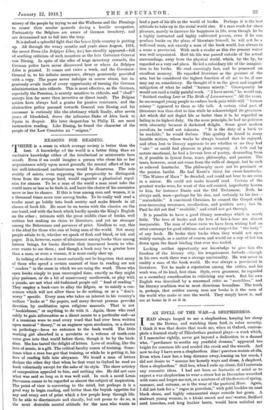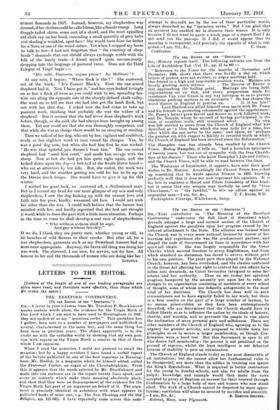AN IDYLL OF THE WAR—A SHEPHERDESS.
IHAD always longed to see a shepherdess, keeping her sheep .1 on the Downs, and watching them feed, in sober security. I think it was that desire that made me, when at Oxford, contem- plate a learned study of Elizabethan pastoral plays—a work which, if I remember rightly, never got beyond a dedication to a damsel who, "perchance to soothe my youthful dreams," appeared too bright for common life and needed the crook and the wreath. And now to-day I have seen a shepherdess. Alas! quantum mutates ab ilia. Even when I saw her, a long distance away, leaning on her crook. I did not desire to " assume her homely ways and dress, A shepherd, thou a shepherdess." Still less, when I rode up closer, did I entertain any romantic ideas. I had not been so fantastic of mind as to expect a war shepherdess to wear a straw hat in December wreathed with roses and forget-me-not, or a mixture of all the flowers of spring, summer, and autumn, as is the wear of the pastoral Muse. Again, I did not look for a " rogue in porcelain," with gold buckles on neat black shoes, and highly ornamented stays outside her gown. A stalwart young woman, in a khaki smock and sou'-wester, Bedford cord breeches, and long leather boots, would have satisfied my
utmost demands in 1917. Instead, however, my shepherdess was dressed, if her clothes could be called dress, like a female tramp. Long draggle-tailed skirts, some sort of a shawl, and the most appalling old cloth cap on her head, concealing a small quantity of grey hairs and shading a wrinkled, aged face ! She would have done far better for a Norn or one of the weird sisters. Yet when I stopped my horse to talk to her—I had not forgotten that " the courtesy of shep- herds " demands that one should always exchange words with the folk of the lonely trade—I found myself quite unconsciously stropping into the language of pastoral verse. Does not the Third Eclogue of Virgil begin :— " D:e mihi, Damoeta, cujum peens? An Moliboei " ?
At any rate, I began: "Whose flock is this ?" She answered, out of the book: " It's Farmer Black's. First the one-armed shepherd had it. Now I have got it," and her eyes looked lovingly on as fine a flock of ewes as you could wish to see, spreading fan- wise out along the opposite side of the sharply defined chalk valley. She went on to tell me that she had also got the lamb flock, but not with her that day. I asked how she had come to take up pastoral work, thinking that probably she was the widow of a shepherd. But it seemed that she had never done shepherd's work before, though, as she said, she had always been brought up among them. Yet one could see that she was thoroughly competent, and that while she was in charge there would be no straying or stealing.
Then we talked of her dog, who sat by her, vigilant and confident, ready at her slightest word to race round his charges. Yes, he was a good dog now, but when she had him first he was wicked. "He was that spiteful, you dursen't trust him." The one-armed shepherd had " used him cruel," and made him savage with the sheep. Now at last she had got him quite right again, and she looked down upon the dog—a bob-tail of the South Down breed— who sat at attention by her side. But, she ended, the work was very hard, and the weather getting too cold for her to be up on the Downs much longer. She would have to give it up for this winter.
I wished her good luck, an ' cantered off, a disillusioned man. But as I turned my head for one more glimpse of my one and only shepherdess, I saw the dog looking up with the utmost love and faith into her poor, kindly, weazened old face. I could not wish her other than she was. I could well believe that the farmer was satisfied with her, and hardly regretted that she had not thought it worth while to dress the part with a little more attention. Perhaps in the time to come we shall develop a real race of shepherdesses,
" Who without sadness shall be sago,
And gay without frivolity."
If we do, I think they are pretty sure, whether young or old, to tie bunches of wild flowers to their crooks. But after all, for a war shepherdess, garments such as my Downland Amoret had on were more appropriate. Anyway, the brave old thing was doing her war-work. She shivered, I am sure, for service, not for hire. All honour to her and the thousands of women who are doing like her !
IONOTUS.



























 Previous page
Previous page